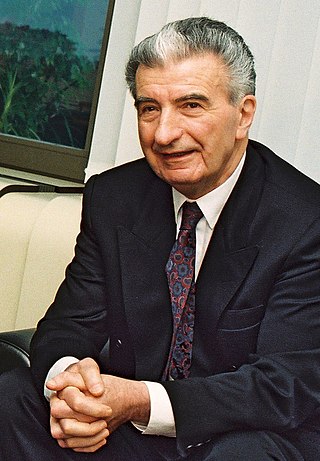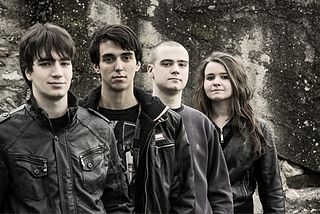
Kiro Gligorov was a Macedonian politician who served as the first president of the Republic of Macedonia from 1991 to 1999. He was born and raised in Štip, where he was also educated. He continued his education in Skopje and graduated in law in Belgrade. During World War II in Yugoslav Macedonia, he worked as a lawyer and participated in the partisan resistance. By the end of the war, he was an organiser of the Anti-fascist Assembly for the National Liberation of Macedonia, the predecessor of the Socialist Republic of Macedonia as a federal Yugoslav state.

The Football Federation of Macedonia – FFM or Football Federation of North Macedonia is the governing body of football in North Macedonia, based in Skopje.

The League of Communists of Macedonia was the Macedonian branch of the ruling League of Communists of Yugoslavia during the period 1943 – 1990. It was formed on the basis of the Regional Committee of Communists in Macedonia under the name Communist Party of Macedonia during World War II in Yugoslav Macedonia. It retained that name until April 1952.
Bulgarians are an ethnic minority in North Macedonia. Bulgarians are mostly found in the Strumica area, but over the years, the absolute majority of southeastern North Macedonia have declared themselves Macedonian. The town of Strumica and its surrounding area were part of the Kingdom of Bulgaria between the Balkan wars and the end of World War I, as well as during World War II. The total number of Bulgarians counted in the 2021 Census was 3,504 or roughly 0.2%. Over 100,000 nationals of North Macedonia have received Bulgarian citizenship since 2001 and some 53,000 are still waiting for such, almost all based on declared Bulgarian origin. In the period when North Macedonia was part of Yugoslavia, there was also migration of Bulgarians from the so called Western Outlands in Serbia.

The following outline is provided as an overview of and topical guide to North Macedonia:
Boškov Most Hydro Power Plant, referred to as Boškov Most HPP, is a derivation plant planned to be built in Mala Reka valley, in the southernmost part of the Mavrovo National Park, in North Macedonia. It will have a total capacity of 71,5 MW. Construction is expected to last 4 years.

The national emblem of North Macedonia depicts two curved garlands of sheaves of wheat, tobacco leaves and opium poppy fruits, tied by a ribbon decorated with embroidery of traditional Macedonian folk motifs. In the center of the ovoid frame are depicted a mountain, a lake and a sunrise. The features of the national coat of arms contain a rising sun which symbolizes freedom, the Šar Mountains with its peak named Ljuboten or Mount Korab and the river Vardar, with Lake Ohrid. The emblem also contains opium poppy fruits; this poppy was brought to the area during Ottoman times in the first half of the 19th century. Until 16 November 2009, the emblem also depicted a socialistic five-pointed star in the top. This emblem had been in use since 1946, shortly after the republic became part of Yugoslavia.

Lesbian, gay, bisexual, and transgender (LGBT) people in North Macedonia face discrimination and some legal and social challenges not experienced by non-LGBT residents. Both male and female same-sex sexual activity have been legal in North Macedonia since 1996, but same-sex couples and households headed by same-sex couples are not eligible for the same legal protections available to opposite-sex married couples.

Skopje 2014 was a project financed by the Macedonian government of the then-ruling nationalist party VMRO-DPMNE, with the official purpose of giving the capital Skopje a more classical appeal but designed more earthquake-proof. The project, officially announced in 2010, consisted mainly of the construction of colleges, museums and government buildings, as well as the erection of monuments depicting historical figures from the region of Macedonia. Around 20 buildings and over 40 monuments were to be constructed as part of the project.

The Museum of the Republic ofMacedonia, formerly and still unofficially known as the Museum of Macedonia, is a national institution in Macedonia and one of the oldest museums in the country. It is located in the Old Bazaar in Skopje, near the Skopje Fortress. The Museum of the Republic of Macedonia was created by joining three museums in one. The three museums that were unified were the archaeological, historical and ethnological museum, of which the archaeological museum was the oldest one; it was opened in 1924 and that date is considered as an establishing date of the national museum. During the existence of the Socialist Republic of Macedonia, the museum was known as People's Museum of Macedonia.

Nikola Mladenov was a Macedonian journalist, actor, founder and managing editor of the weekly newspaper Fokus, widely regarded as one of the most reputable journalists in Macedonia, who along with his colleagues from the newspaper Mlad borec is considered to have laid the basis for the pluralistic principles in the Macedonian journalism. The "Award for best research story of the year – Nikola Mladenov", which is awarded by the Macedonian Institute for Media, is named after him.

Vizija is a Macedonian rock band formed in November 2011 in Skopje. The band's first performance was at T'k – tak fest 2012 in Kavadarci, shortly followed by the Taksirat music festival in Skopje. Vizija's first performance outside Macedonia was at Skladiste Fest in Kruscic in 2013. The band has performed at some of the biggest festivals in the Balkans like Exit (Serbia), Gitarijada (Serbia), Demofest, Taksirat (Macedonia), Lake Fest (Montenegro), Mikser (Serbia), T'k - Tak (Macedonia) and Rock n pop the borders (Bulgaria). The band received excellent reviews from the American radio station WMBR and British music website Emerging Indie Bands which, on its list of the 1990s' best new bands from around the world for 2014 placed Vizija in seventh place.

Jakov of Kamena Reka or Yakov Kraykov, was a Venetian printer. The information about his life is scarce. It is known he was from a former village called Kamena Reka, according to him near the town of Kolasia, in Osogovo, Macedonia.

In April 2016, protests began in the Republic of Macedonia against the incumbent President Gjorge Ivanov and the government led by the interim Prime Minister Emil Dimitriev from the ruling VMRO-DPMNE party. Referred to by some as the Colorful Revolution, the protests started after the controversial decision by President Gjorge Ivanov to stop the investigation of former Prime Minister Nikola Gruevski and dozens of politicians who were allegedly involved in a wiretapping scandal. The demonstrations were organized by "Protestiram" and supported by a coalition led by the Social Democratic Union of Macedonia and other opposition parties, in addition to the newly formed Levica demanding that the government resign and be replaced by a transitional government and that the parliamentary elections planned for 5 June 2016 be cancelled, on the grounds that the conditions for free and transparent elections were not in place. The government and its supporters, who had organized pro-government rallies, maintained that the elections on June 5 were the only solution to the political crisis, with some observers blaming the opposition for creating a "Ukraine scenario" in Macedonia.
Elektrani na Severna Makedonija or ESM is a government-owned electricity producing company in North Macedonia.
EVN Macedonia is a power distribution and supply company in North Macedonia. It was split in 2005 from former state integrated power company ESM and bought in 2006 by Austrian-based EVN Group. The company has about 800 000 electricity meters in the country.

Blaga Aleksova was a Macedonian archaeologist.
The 2020–21 Macedonian Football Cup was the 29th season of North Macedonia's football knockout competition. This edition did not have a defending champions due to the interruption of the previous edition due to the COVID-19 pandemic.
The 2021 North Macedonia census, officially known as the Census of Population, Households and Dwellings, 2021, was the third census held in North Macedonia since independence, and the first since 2002. The census recorded a resident population of 1,836,713, a decrease of 9.2 percent, or 185,834, over the preceding 19 years. The census was taken during the COVID-19 pandemic, which affected its administration. It was also considered controversial by some Macedonian groups; the opposition party The Left openly led a boycott. 132,260 individuals did not participate in the census and are officially labelled as "persons for whom data are taken from administrative sources"; no ethnic, language, or religious information is available for these individuals. Nonetheless, the head of the State Statistical Office, Apostol Simovski, stated that the census was successful. The ruling government and the European Commission also welcomed the results.













